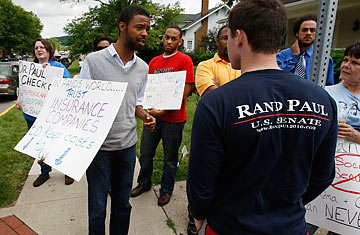
Demonstrator Perry Green, left center, talks with Rand Paul supporter Jason Durda as they meet across the street from a Republican Party unity rally in Frankfort, Ky., Saturday, May 22, 2010.
Days after Tea Party-backed insurgent Rand Paul trounced the establishment candidate Trey Grayson in the Republican primary for an open U.S. Senate seat in Kentucky, the party held a "unity" rally meant to bring the troops together for the general election.
Whatever discomfort party insiders may have with Paul, none of it was voiced publicly at the Saturday morning event. Everyone who spoke at the rally — from former Republican National Committee chairman Mike Duncan to Senate Minority Leader Mitch McConnell — stressed the importance of retaining the seat being vacated by Sen. Jim Bunning, and sought to unify the race by invoking ire against President Barack Obama, Senate Majority Leader Harry Reid and House Majority Leader Nancy Pelosi.
"These people need to stopped," McConnell told the crowd of a couple hundred people, who jammed into a large room inside the party headquarters, an old Victorian house near the state capitol that is named for McConnell. (Meanwhile, a small group of Democrats held a quiet protest cater-cornered from the headquarters; organizers told TIME they simply wanted to send a message that Paul's views do not represent everyone's views in Kentucky.)
Paul, an ophthalmologist from Bowling Green and the son of U.S. Rep. Ron Paul (R-Texas), upset political orthodoxy in Kentucky when he entered, and then dominated, the Republican primary against Grayson, the current Secretary of State whom McConnell recruited after forcing Bunning out. An avowed Libertarian, Paul has made waves by refusing to say whether, if elected, he would support McConnell as the party leader, and this week he generated controversy with remarks suggesting that he doesn't support the entire Civil Rights Act and that Obama sounded "un-American" when he criticized BP for the Gulf of Mexico oil spill.
None of that came up during Saturday's official program. Instead, three of Kentucky's four Republican congressional representatives — Hal Rogers, Brett Guthrie and Ed Whitfield — made brief remarks in support of Paul. Grayson spoke next, noting areas where he and Paul agreed — both are against profligate government spending and abortion, he said, and both support coal energy. McConnell spoke afterward, followed by Paul. (Rep. Geoff Davis did not attend, citing a prior family commitment. Nor did Bunning, though no reason was given.)
Those reading between the lines might note that McConnell mentioned Paul by name only once, near the end of his slot, and that Paul mentioned Grayson and McConnell just once each during his four-minute remarks, in a rally that lasted about 40 minutes. Paul and Grayson did not shake hands nor did they address one another in public view.
After the rally, Grayson fielded questions from the media, admitting that the situation was awkward but pledging to work on Paul's behalf. "Dr. Paul and I talked a couple of days ago," Grayson said. "I'll do what he asks me to do. I've been a good Republican. I'm gonna stay a good Republican and stay engaged."
Nearby a crowd gathered in front of the headquarters hoping to glimpse the political stars inside. Paul eventually walked out the front door and down the steps. He shook a few hands, but declined a suggestion from David Adams, his campaign manager, to make a few remarks. Then he turned and went back inside.
At about the same time, McConnell slipped out the back door largely unnoticed and stepped into a waiting Chevy Suburban, declining to answer questions from TIME.
While some insiders may have opted not to attend the rally, Ellen Williams, who chaired the Kentucky Republican Party from 1999 to 2004, said the size and make-up of the crowd were about what she expected. "I saw virtually all of the executive committee members, I saw state senators and state house members — many who endorsed Trey early on," said Williams, who works as a lobbyist. "Mitch McConnell being here was huge."
